“GENOCIDE” — WHAT DOES IT MEAN?
This essay was in the Cleveland Plain Dealer last week . . .
“Genocide” — what does it mean?
CLEVELAND HEIGHTS, Ohio — Sean Martin, the assistant curator for Jewish history at the Western Reserve Historical Society, once taught an online course called “Comparative Genocide.” The course was offered through Gratz College, in Philadelphia. I said to Sean, “I think Don DeLillo wrote about Hitler Studies in a novel. That was a novel. ‘Comparative Genocide,’ is that a real course?” It was. (This was 13 years ago.) Now it’s called “Genocide in the Modern World.”
“Genocide” – the word – what does it mean?
Pope Francis, in his new book, says that Israel’s retaliation in Gaza should be investigated to determine if it meets the legal definition of genocide. Patricia Heaton — a former Clevelander, Catholic, and TV actor – said the pope should “look up the definition of genocide.”
Heaton also said on “Elizabeth Vargas Reports” that, “Israel is trying to find the hostages, release them, take out the Hamas leaders and end the war.” She said, “It’s time for every American, and in particular Christians, to stand up and make sure our representatives know they have to help Israel.”

(Illustration by Ralph Solonitz)
The word “genocide” was coined by a Polish Jewish lawyer, Raphael Lemkin, in 1944. He ingeniously combined the Greek “genos” (tribe) and Latin “cide” (killing). Genocide, he wrote, is the slaughter and attempted elimination of a people, a culture, an ethnicity.
Killing a lot of people – is that genocide? It’s most often war. For instance, America bombed Germany. That was war. Germany sidetracked its military effort specifically to gas Jews-for-being-Jews. That was genocide.
I visited an old college friend, John, in Chicago. His front door had a poster, “Stop the Genocide in Gaza.” We talked about old times. Toward the end of our what’s-up conversation, I said, “What’s with the sign?” He had gotten it from the radical group Jewish Voices for Peace, so the sign was “kosher,” John said. John isn’t Jewish.
One question, John: If the Israelis are committing genocide, why are there some 7 million Palestinians in the Middle East today, including more than 2 million in Gaza alone? There had been about 1.2 million Palestinians in 1947. Israel is doing a lousy job of committing genocide, apparently. I didn’t mention any of this to John because I was timid.
Earlier this month, I finally spoke up — at a Cuyahoga County Council meeting downtown. I spoke during the “public comment” portion. Granted, speaking to 11 somewhat-bored council members was a lot less fraught than telling an old friend where to go. The council members probably would have preferred hearing about countywide childhood mental-health issues or summer youth-employment programs, but a lot of commenters wanted to talk Israel/Gaza. I said to the council, “Some people think there are three kinds of Jews: Reform, Conservative and Orthodox. Wrong. There are these three types: American Jews, Israeli Jews, and victims of the Holocaust. Six million to 7 million each. We don’t want the Jews of Israel to be wiped out.”
The county has invested $16 million in Israel Bonds. (The bonds aren’t a gift. The county gets the money back plus interest.) Some anti-Israel speakers used the word “genocide.” A woman talked about local issues – and even used the word “genocide.” She said, “Think about the genocide here in Cleveland with the homelessness.”
Hamas, Hezbollah and Iran have repeatedly said – and acted on – their desire to eliminate Israel — the one Jewish state, home to half the Jews in the world.
That’s genocide. Update your dictionary.
December 4, 2024 3 Comments
THANKSGIVING GIG
The mother of the bride thought Thanksgiving Day would be a great time for a wedding because nobody would come. The groom’s side was from New York. Flights to Cleveland would be expensive. And many Cleveland guests would skip the wedding to eat Thanksgiving dinner at home with their kids. The cost-conscious mom was cutting serious corners.
 Yiddishe Cup musicians rescheduled their personal Thanksgiving dinners to play the gig. Not an easy task, but doable. Then the mom called me again and said the bride wanted a different band. What? Who? I usually ask who the other band is, but I was so mad — mostly at myself because I had forgotten rule #1 in the wedding-band biz: it’s all about the bride. The bride, not the mom, picks the band.
Yiddishe Cup musicians rescheduled their personal Thanksgiving dinners to play the gig. Not an easy task, but doable. Then the mom called me again and said the bride wanted a different band. What? Who? I usually ask who the other band is, but I was so mad — mostly at myself because I had forgotten rule #1 in the wedding-band biz: it’s all about the bride. The bride, not the mom, picks the band.
I got a call from a bat mitzvah mom. She was a talker, just like the very frugal wedding mom. The bat mitzvah gig was going to be for TG weekend but not on TG itself. I didn’t pitch the mom too hard. I wasn’t crazy about playing on TG weekend. I said, “Yiddishe Cup has been around for decades. You’ve seen us. Everybody has seen us.”
She hired us. Then she canned us. She said her husband was sick. So what? Yiddishe Cup has played for sick people — even dead people; we once played a luncheon where the mom of the bat mitzvah had died the day before. We played in the family room instead of at the party center.
The bat mitzvah mom — the one who wanted us for TG weekend — said her husband had become depressed. The husband, a doctor, had lost a patient that week. Doctors lose patients all the time, right? The mom wanted to change the bat mitzvah date and the number of musicians.
Forget it.
What else can I say?
Happy Thanksgiving.
November 26, 2024 2 Comments
TICKTIN: THE LAST OF
THE KINSMAN COWBOYS
Harold Ticktin died on November 12 at 97. He was the last of the Kinsman Cowboys — guys who hung out on Kinsman Road and BS’d (pre-internet and TV). This blog post is a thoroughly “reported” piece on the only-and-only Ticktin. It helps that I wrote it 12 years ago, while Harold was still alive. I was in steady contact with Harold throughout the years. Arrivedarci, Harold.
—
2012
Harold Ticktin writes a weekly column for the Cleveland Jewish News on Yiddish. For instance, he writes about what balabuste means, or balegole. (Female boss and wagon-driver.)
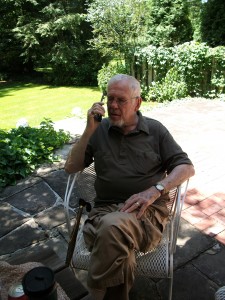
Harold Ticktin, Shaker Heights, 2012
Also, Harold occasionally reflects on early-20th century leftist politics for magazines such as Jewish Currents.
I asked Harold for a couple Yiddish translations. I was in his backyard in Shaker Heights. I wanted to know Yiddish permutations on “How’s it going?” — everything from “How are you?” to “What’s happnin’, man?” Ticktin gave me some options, none perfect, and concluded, “Translation is treason.”
He continued, “Listen, there was this pharmacist who did a big business in trusses – you know what a truss is?”
“Yes.”
“The pharmacist’s slogan was Ayer kile iz undzer gedile — your hernia is our pleasure. I told the pharmacist that was a horrible translation. He told me to come up with a better one. I said, ‘Your rupture is our rapture.’ Wouldn’t that make a great bumper sticker for an abdominal surgeon?”
“Did you make that up — your rupture is our rapture?” I said.
“That’s a true story. It’s an absolutely true story.”
Ticktin is a retired workers’ comp lawyer. He can speak decent Italian, French and Spanish, as well as Yiddish. One of his favorites translations is All Screwed Up, he said, for the Lina Wertmuller film Tutto a posto e niente in ordine, which literally means “everything ready, nothing works.” “You don’t translate, you render,” Ticktin said.
Ticktin continued, “James Thurber ran into a woman in Germany who said, ‘I love your work in German.’ Thurber said, ‘Yes, it’s true, my work loses something in the original.’”
Ticktin lives three miles from his old stomping grounds — the Kinsman neighborhood. Harold grew up on E. 154th Street, Cleveland, hard by the Shaker Heights-Cleveland line. He said Shaker had been “hakodesh hakadashim [the Holy of Holies] — the other.” Shaker had been nearly unapproachable, like the inner sanctum at the Temple in Jerusalem. “I didn’t know anybody in Shaker. Maybe one person.”
Kinsman Road was Ticktin’s main artery. He said, “I walked [down Kinsman] from 154th to E. 140th to observe the class struggle. My father was a Yankee. He came over here when he was two. He liked baseball. What did he know about politics? He knew this: Roosevelt was great and Hitler was bad.”
At E. 146 Street, Harold met Peter “The Brain” Ostrovsky. “I was converted to communism by Ostrovsky on the train to the Philly Navy Yard in 1946. I was converted just west of Pittsburgh.”
The upshot: “I saw the God who was to fail, though I still have a warm spot for Marx, for his Lincoln correspondence,” Harold said. “I’m a member of the extreme center now.”
I wanted Ticktin to give me a tour of Kinsman — the proste, working-class Kinsman of his youth. “How about it?” I said. “Now?” Ticktin agreed. We got in my Lolly the Trolley — my Mercury Sable.
***
Stop 1. Woodhill Park at E.116th. Ticktin: “I remember when I was 10 years old [1937] at Woodhill. It was a tremendous swimming pool. Everybody got out of the water. Why? Because Frieda Katz, a geferlikher (dyed-in-the-wool) communist took a swim with a black kid. The place cleared out. This was Frieda Katz from Katz’s Deli at E. 147th and Kinsman.”
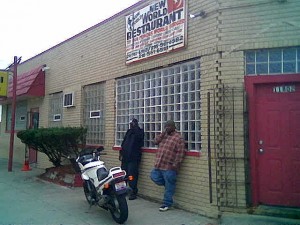
Formerly Seiger’s
2. Seiger’s deli at 118th. “I knew Hymie Seiger best. He went off to yeshiva in junior high. He just left. I didn’t even know what a yeshiva was.”
3. E. 121. “This was where I attended my one Seder as a child. On that street. Very important.” Ticktin eventually became president of his shul.
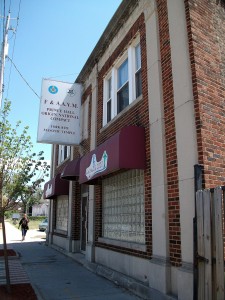
Council Educational Alliance building, now a Masonic hall
4. 13512 Kinsman, the Council Education Alliance. “The apex and GHQ [general headquarters] of my youth. The Communist Club met there.” It was a settlement house.
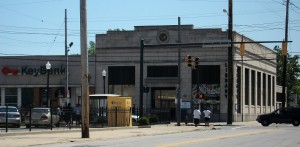
Cleveland Public Library – Mt. Pleasant branch
“In the 1936 election, the Communist Club painted ‘Vote Communist’ in blue on the library at E. 140th. The library had been a bank before. Some members of the club got mad because the graffiti was blue. They said, ‘We need to paint it red.’ Ostrovsky went back to re-paint it and got caught. He was defended by Yetta Land, who handled all the communists. I don’t think Ostrovsky was punished too severely; he was a juvenile.”
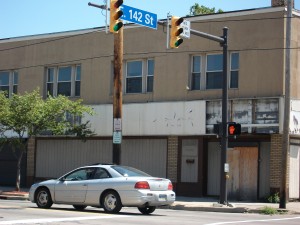
Formerly Spumoni’s (middle store)
5. E 142 and Kinsman. “We called this place Spumoni’s. The real name was Giaimo’s — an ice cream place. The communists met across the street above the Woolworth’s, which is long gone.
“On Saturday nights all the single Jewish guys would hang out here at Spumoni’s and greet each other Marty-style, like, ‘Whadaya want to do, Marty?’ This went on up through the 1940s and 1950s.”
“What’s Marty-style.”
“Like Marty, the movie with Ernest Borgnine. You don’t remember it?”
“No.”
“Single Jews guys — and married Italians — hung out, to go out on the town. I always envisioned a cowering Italian wife in the kitchen back home saying, ‘Tony, when you gonna be home?’”
6. E. 154th / the Shaker Heights line. “Hakodesh — the other,” Ticktin said. “I was in New York once and stopped in at YIVO [Jewish Research Institute] for a list of places European Jews had vacationed before the war. I needed this for a speech in Yiddish. They asked me, ‘You mean intellectuals? Peasants? We’ll get back to you.’ They didn’t get back to me. A couple weeks later, I’m at a gathering of Jews and Poles in Cleveland, an American Jewish Committee meeting, and I meet the speaker, a prominent Polish Jew, Lucjan Dobroszycki, the editor of the Chronicle of the Lodz Ghetto. I ask him about vacation spots before the war. He looks at me and says, ‘This is the second time in two weeks somebody has asked me this question.’ End of the line, Lucjan Dobroszycki — don’t ask me how to spell that.”
7. I drive Harold Ticktin into Shaker Heights. Another end of the line.
—
The photos, above, are from 2012, except the former Seiger’s deli pic, which is from 2010. Seiger’s — later New World Restaurant — is boarded up.
—
The Yiddishe Cup Trio (Alan Douglass, Steven Greenman and Bert Stratton) plays a free one-hour concert 4 pm this Sunday (Nov. 24) at Beth El – The Heights Synagogue, 3246 DeSota Ave., Cleveland Heights.
November 19, 2024 1 Comment
GOING SOLO
“Side Project”: A musician breaks away from his band and does his own thing. Almost all musicians do it, at least on occasion. But because my axe is clarinet, I can’t break away easily. Nobody wants to hear solo clarinet. I’m chained to my farkakte bandmates!
Not true. Last month I was hired at the last minute — a day prior to the gig — for a Holocaust survivors’ luncheon. My accompanist, pianist Alan Douglass, couldn’t make it. But Alan had fortuitously produced some backing tracks for me a while back, just in case.
And this was the case: Alberto Solo. I played “Besame Mucho,” “Di Grine Kusine” and “Moscow Nights.” I even blew shofar, clarinet-style. This was during the High Holidays.
Nineteen people, total. I reached all 19, I think. I sat with them; I ate with them; and played clarinet while seated at various tables. There was some sort of chicken roll, courtesy of the kosher caterer. “You Are My Sunshine,” “Misty,” klezmer instrumentals, and “Tumbalalaika,” of course.
I talked to a Romanian woman about her granddaughter, who plays drums in Broadway shows. A Polish woman jokingly said she has a German brother and an Italian brother. Her brothers were born in DP camps.

Former bandmate Irwin Weinberger, and his father, Herman, 1966. Herman was a Holocaust survivor from Poland.
I got paid by the Jewish Family Service Association and Germany, via an understanding called the Conference on Jewish Material Claims Against Germany — a worldwide Holocaust-reparations cultural-enrichment program.
I’ve previously played this gig with Alan. Two years ago I wrote about it: “Holocaust Remembrance at Cafe Europa. Everybody in the audience had an astonishing story.” (link, no paywall: Wall Street Journal.)
I needed Alan two years ago. Who needs him now?

Alan Douglass, 2011. He’s one of the best musicians in Cleveland. Ask anyone.
November 13, 2024 No Comments
PRECIOUS
You are precious. You suck.
You are overrefined and inauthentic.
A cappella music is precious. All of it. A friend once told me that. Harvey Pekar called Willio & Phillio precious. (Willio & Phillio were a talented 1980s-era Cleveland comedy/music group.) Maybe Harvey called Willio & Phillio precious because they were not anti-social like he was.
Willio & Phillio — the name — was certainly precious, and they should have changed it. Eventually Will Ryan (Willio) went out to Los Angeles to work for Disney, and Phil Barren (Phillio) became a cantor in Los Angeles.

2004
Yiddishe Cup — hate to say it — is precious. But only occasionally, like when we say “oy vey” followed by “olé.” Maybe we should disband.
Peter Laughner, the Cleveland guitarist, died from drug and alcohol abuse at 24. He was not precious. (He was part of the Pere Ubu underground scene.)
One last thing: You’re precious!
November 6, 2024 2 Comments
THE COST OF LIVING
This essay was in the Cleveland Plain Dealer last week.
The Cost of Living
LAKEWOOD, Ohio — Some older folks like to regale young people with stories about how matinee movies cost 25 cents, circa 1960. These old folks rarely mention 25 cents in 1960 equals $2.66 in today’s money. And Coca-Cola was a dime. Give me a break; I always try to reference the Consumer Price Index (CPI) whenever I do historical flashbacks.
The CPI is a big part of my life and job. I’m a landlord. I don’t go ballistic with annual rent raises, but enough to stay in the game. An efficiency apartment in Lakewood goes for about $700/month. That’s a bare-bones, 1920s-era apartment — no dishwasher, no air conditioning, no elevator. Academics call these apartments “workforce housing.” Tenants get a kitchen, bathroom, and a living room that doubles as a bedroom. About 350 square feet. You don’t throw big parties. If you lay out your efficiency tastefully, you can call it a studio. I’ve seen studios that look like sleek Pullman cars, with everything in just the right place. I’ve seen expensive folding bikes hanging on racks along walls. An efficiency can be a work of art, or just a huge mound of dirty clothes in the center of the room. Depends on the tenant.
Bill rented an efficiency in Lakewood. His apartment was clean, small and cheap, period. Nothing fancy. Bill told me his rent check had been stolen. He had never been late with his rent before. I went to the Lakewood police station with him. A police officer asked his name. Bill said, “Bill.”
“William?” the policeman said.
“Bill . . . Bill R. Hunter.” Bill had moved to Cleveland from Kentucky decades ago and was a retired factory worker. He smoked a lot, and his right hand had no fingers. We repainted Bill’s apartment walls nearly every year because the government wanted the walls to not look like the color of Bill’s lungs. Bill’s rent was partially subsidized by the government.
Eventually Bill was reimbursed for the stolen rent payment by a money-order company. A crook had knocked Bill down on Detroit Avenue and cashed the money order. The cops nabbed the robber several weeks later. Lakewood police are good.

Detroit Avenue, Lakewood, Ohio
But then Bill missed two rent payments in a row. I found out he was in a nursing home. I wondered, “How creepy would it be for me to try to collect the rent at a nursing home?” Bill’s distant relatives didn’t answer my calls, and the government stopped paying its portion of the rent. I went to the nursing home, which was right across from Bill’s apartment. Bill — with oxygen tubes in his nose — muttered to me, “You’ll get paid.” Flat on his back, he balanced a wallet on his chest. He counted out the rent. “Here you go, buddy.” He called a lot of people buddy.
Then Bill’s wallet vanished, and so did Bill. He wasn’t at the nursing home, and he wasn’t in the hospital. And he wasn’t in the obits. And he owed rent. The housing agency eventually gave me a “case closed” green light to enter Bill’s apartment. We pitched Bill’s belongings into the dumpster, except for his TV, which another tenant took.
Bill’s wooden floors hadn’t been re-sanded in19 years. That’s how long he had lived in the efficiency. The cost of re-sanding floors was up 94%. Inflation was up 53%. Bill’s rent was up 64% in those 19 years.
I called the Ohio Bureau of Vital Statistics. A clerk said she had many dead Bill Hunters on file. I said “Bill R. Hunter. Lakewood.” She said he had died shortly after leaving the nursing home.
I doubt Bill ever checked the cost of living. He didn’t need to. He lived it. He used to write “rant” in the subject line on his checks.
October 30, 2024 1 Comment
I LIKE DRUNKS
I was an adjunct professor at the local community college, teaching creative writing, creative non-fiction, and “I’m Creative!” (a course I made up). Whatever worked. I might do teaching again, maybe in retirement. The money was horrible but I enjoyed the kids.
I was in the family landlord biz, too.

Chris Kraus
Years ago I was interviewed in a mag, Rust Belt / Waist 40, about my landlord shtick. There are approximately two landlord-writers in America. There’s an avant-garde landlord in Los Angeles who wrote a book called I Like Dick. She’s Chris Kraus. She liked a guy named Dick. Her books have been reviewed in the New York Times and all over. She bought four buildings in Albuquerque in 2005. She doesn’t mention that often, but she doesn’t hide the fact, either. She said in an interview, “I spend a couple of hours each day dealing with leaking roofs and plumbers and laminate floors.”
Me too. And don’t forget late-payers, and tenants with eight cats, and tenants who break toilet tanks because they’re super-fat and drunk. I Like Drunks. I should write that.
—
This post is 50% fiction, but Chris Kraus is real.
—
Yiddishe Cup plays 7:15 pm tomorrow (Thurs. Oct. 24) at Park Synagogue, Pepper Pipes, Ohio. Simchat Torah. Free and open to the public.
October 23, 2024 3 Comments
A SUSPICIOUS DEATH
There was a “suspicious death.” Apartment 31. At least three gunshots.
I’m hoping it’s suicide. I’m told there are gunshot holes in the bedroom ceiling and wall. I haven’t been in the apartment. There is a coroner’s seal on the door.
Samantha Kovach — the dead tenant — was a secretary. She was 30. She had multicolored hair and was into emo music. I learned all this on Facebook. I’m told Ms. Kovach was a “scene kid.” That’s a certain style. My building manager said Ms. Kovach had guys over a lot and dressed kind of “ghetto” and “whorish.”
Ms. Kovach paid her rent on time and was quiet. I didn’t know her.
I’m putting this letter in the entranceway of the building:
As you no doubt know, Samantha Kovach, a tenant here, died on Sunday. Gunshots were heard coming from the suite. I have been talking to Lakewood police every day. Right now the death is classified as a “suspicious death.” The coroner’s report is not back yet.
What this means: the police are working on the case and haven’t concluded anything, at least publicly. The lead detective told me, though, “The tenants there have nothing to worry about.”
But if you have any questions or concerns, or information, feel free to call Detective __________ at 216-_______
Lakewood is one of the safest places around, and the police are quite good.
Sincerely,
Albert Stratton
Gadson, a neighboring tenant, is freaking out and wants to move. I told him, “You’re being irrational. Lakewood has a murder every two years. Maybe this is a suicide.”
We had towed a male visitor’s car from Ms. Kovach’s parking spot a month ago. Maybe that’s a lead. I’ll tell the police.

A random internet photo of a scene girl. Not Ms. Kovach
I’m not sure what kind of life Ms. Kovach lived. I hope to learn more from the family, or the papers, or from the detective.
. . . Nothing. All kinds of stuff online and in the papers about burglaries and stolen cars but nothing about a possible homicide. Nothing from the parents. The detective said to me, “You don’t know half of what I know.” True. “The people she hung around with generally don’t call the police.”
The coroner’s report isn’t back.
. . . Back now: The cops called and said it was a suicide. She shot herself and apparently missed a couple times. The cop said he has the gun and wants to let the family in the apartment after all the blood is cleaned up. “We don’t want to traumatize anybody,” he said.
The maintenance man reports: “The apartment is not bad, really, dude, and she was good-looking, judging from the pictures, but that don’t matter.”
“Not too much coagulation,” another maintenance man said. (He had worked in law enforcement.) “Just blood. No bugs.”
And a cat. “A big fat gray one under the bed. I gave him some tuna fish.”
I need to post a note in the lobby that says Ms. Kovach killed herself so the other tenants will cool down. Done . . .
The funeral for Samantha Kovach, who lived here, is Saturday. Details are available online. Yesterday the coroner ruled her death a suicide. The investigation is now closed. May she rest in peace.
—
“Samantha Kovach” is a pseudonym. This happened 10 years ago.
October 16, 2024 2 Comments
BLOG QUIZ
“I’ve read every word of your blog,” a musician told me.
Hooray for him. I wrote every word.
At shul, a reader told me, “You found your subject. Toby.”
No, you did. I’ve had Toby (my father) on the brain for decades.

Toby Stratton, 1938. OSU graduation.
A woman told me, “I look forward to your Wednesday-morning posts. I don’t do comments.”
My comment: 95% of readers don’t do comments. They’re above that.
Several readers claim they’ve read every word of this blog. OK, prove it:
1. What was the name of Yiddishe Cup before it was Yiddishe Cup? A. Wild Horses B. Funk a Deli C. Kosher Spears.
2. Who invented klezmer? A. The Jews B. The Klezmorim (Berkeley) C. Henry Sapoznik.
3. What was Toby Stratton’s legal first name? A. Toby B. Theodore C. Wayne.
4. What did Toby want buried with him in his coffin? A. Chlortrimeton allergy pills B. An Indian-head nickel C. The Wall Street Journal.
5. How do Yiddishe Cup musicians refer to their bandleader? A. Ding-a-ling B. Pissant C. Sir.
6. Yiddishe Cup has played: A. Brooklyn, N.Y. B. Brooklyn, Ohio C. Neither.
7. A landlord’s biggest problem is: A. water leaks B. bugs C. tenants.
8. Toby’s favorite sport was: A. tennis B. counting Jews in Chinese restaurants C. depositing rent checks.
9. Most often a working musician’s main interest is: A. music B. the food situation.
10. Does Jack Stratton play with Yiddishe Cup? A. Depends on what decade you’re talking about.
11. Which group can you make fun of in Cleveland?: A. Slovenians B. Blacks C. Orthodox Jews D. Slovenians.
12. Which is the hardest to find? A. A plumber B. roofer C. electrician D. door-buzzer guy.
October 9, 2024 No Comments
I DON’T LIKE ROCK ‘N’ ROLL
The Hollywood Palladium on Sunset Boulevard . . . I used to bump into Larry there. He always considered himself second-string to Guy Lombardo. Lawrence Welk – I miss him.
I detest rock music. The Beatles’ “Yesterday” is good, and so are a couple tunes by Billy Joel. That’s it. I miss Guy and Larry. And don’t get me started on hip-hop.
I play clarinet. Are you familiar with clarinet? Nobody plays it anymore. A friend of mine — a music teacher — tells kids not to play clarinet. There are no clarinet heroes to look up to these days, and the axe is too hard. There used to be Pete Fountain, but that was 50 years ago. It’s a dead axe.
I like the woody middle register of the clarinet — you can’t beat it. The clarinet talks, and it says “This ain’t rock ‘n’ roll!”
Klezmer? What about it? Klezmer had a moment. Maybe it’ll come back. In the meantime I play standards at nursing homes, and not just in Cleveland. I’ve played the Century Village circuit in Florida. What does an 80- year-old man smell like? Depends.
I talk to my audience before I play, like “How about those Guardians?” Sports talk. I played with Goodman at the Music Hall in Cleveland. Benny and I traded eights. Wait, I’m imaging that.
Rock ‘n’ roll came. And I went. I barely survived. Luckily I got gigs on the cruise ships. Google “Bert Stratton.” I’m a favorite on the Princess Line. I love the fun on the ships. Everybody forgets their troubles. I’ve been all over the world.
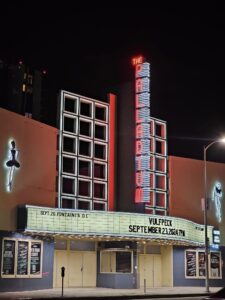 Have you ever been to the Hollywood Palladium? I have. Have you been to any ballroom? Are you familiar with the Aragon in Cleveland? I’m not talking about the Agora, the rock club. I had steady work. Then the money dried up . . . crazy rock ‘n’ roll.
Have you ever been to the Hollywood Palladium? I have. Have you been to any ballroom? Are you familiar with the Aragon in Cleveland? I’m not talking about the Agora, the rock club. I had steady work. Then the money dried up . . . crazy rock ‘n’ roll.
I have friends visiting Cleveland soon. Old chums. Stipulation: no tour of the Rock Hall. We don’t want to see kooks’ costumes.
I once bumped into Lawrence Welk in Detroit. He had just signed with Dodge for a TV show. He was jumpy. He said, “Guy had a TV show and it was a flop. I don’t know.”
I like Larry. My grandkids don’t know from Lawrence Welk. My kids don’t know either.
One more thing . . . And this is crazy. I met Al Jolson. He told me I need to talk to the audience before I blow a single note. “Say something!” Jolson said “Then you’re on first base. The audience is relaxed, thinking ‘he’s a nice guy.’” Jolie also told me to add humor to my shows. He said I could hem and haw all I want — stumble around verbally. Just communicate. “People don’t want robots,” Jolie said.
I have fans. Jack Saul (a record collector in Cleveland), for instance. He loves my work. Unfortunately he’s dead. A lot of my fans are dead. They count, particularly if they don’t like rock ‘n’ roll.
—
fiction. (Thirty-three percent of this is stolen from Irving Fields’ as-told-to autobio, The Pianos I Have Known.)
October 2, 2024 6 Comments
FALL GUY
I was putting away my tenor sax. I was seated. The wooden chair leg snapped and I fell into a bunch of flower bouquets stage-side. Wet flowers. Luckily I had on a heavy tux jacket. I landed on my shoulder. I wore the heavy tux because it was cold out (earlier this month); the wedding gig was in a tent with no heat. Good news. I didn’t injured anything.
When an old person tumbles, it’s newsworthy, at least to the tumbler. I see falls occasionally on gigs – old people doing the hora and tripping. Once a young woman tripped and broke her ankle. She was scheduled to run a marathon. It’s all about the shoes.

Seven steps in Michigan. (Camp Michigania)
Seven steps in Michigan . . . I was walking down some steps in Michigan last month. The stairs were outside, it was dark and everybody was saying “Look at the blue moon — the super moon!” I did, and I went flying. I had just seen the Olympics on TV; maybe that’s why, in mid-air, I decided to “plant” like a gymnast and then roll on my right shoulder. I had on a polar fleece jacket. Again, nothing happened. 2-for-2.
A friend sprained her ankle hiking in Colorado on vacation. An acquaintance broke her hip in Cuba on a trip (literally); she wound up staying down there a couple extra weeks. In Mexico I fell off a mountain bike and injured my ribs. That was five years ago. I’d like to blank that out. I bruised my ribs. Not broken, not fractured, just bruised. At least I think I was just bruised; I never got an X-ray to find out. I could breathe. It was a little difficult to play the clarinet but I could.
Roll with it. Hope your luck holds.
—
Yiddishe Cup plays the University Heights Fall Fest 12-1 pm this Sunday (Aug. 29) at Walter Stinson Park, 2301 Fenwick Rd, University Heights, Ohio. The event is free.
September 25, 2024 1 Comment
THE STOMACH JEW
English novelist Howard Jacobson described himself as a “stomach Jew” in an interview. He’s a bagel-and lox guy. He doesn’t go to synagogue. He’s a stomach Jew. How about a lung Jew? A vein Jew?
I bumped into Jacobson in London. Former Yidd-Cupper Irwin Weinberger and I ran into him on the street. Irwin and I were over in Londres in 2016. Irwin feigned a British accent while we busked. We did “When I’m 64.” Nothing much happened when we played it. London is big; people ignore you.

Howard Jacobson
I recognized Jacobson’s punim from his book dust- jacket head shots. He won the Booker Prize in 2010. I said to him, “Are you the English Philip Roth?” I couldn’t remember his actual name when I bumped into him. Jacobson acknowledged he was, in fact, the English Philip Roth. Some American book reviewers call him that.
Irwin and I told him we play klezmer and some Catskill’s comedy tunes, and Jacobson said, “Like ‘Bar Mitzvah Ranch?’” (Mickey Katz used to dress up as a Bar Mitzvah rancher in cowboy boots and chaps.) Katz, the musician, was from Cleveland. Jacobson said, “You play for ranchers?” Ohio is ranches.
Goodbye. Jacobson had places to go. A half hour later we ran into him again. What are the chances of that in London? He was with his wife. I should have asked about the “stomach Jew” quote. In America we say “deli Jew.” My dad, Toby, was the king of deli Jews — borscht, halvah, corned beef. He grew up in a deli.
I was once a bagel Jew. I’d go to Bialy’s in University Heights, buy 15 bagels, eat two bagels right away, and drive to my mother’s and give her three, and take home 10. I was more than a bagel Jew. I was a bagel. Next time I run into Jacobson we’ll talk bagels.
September 18, 2024 1 Comment
STAMPS ARE OUT
Some of my friends and relatives are extremely cheap. I know two people who reuse dental floss. I’m not like that, but the one thing I do like to save money on is postage stamps. I won’t use two first-class stamps on a two-ounce letter. I go with one first-class, 73-cent ‘forever’ stamp, plus one “additional-ounce” forever stamp, 24 cents.
I’m a former philatelist. I have a U.N. souvenir sheet from 1965. United Nations stamps were a hot item back then. I got the souvenir sheet as a gift for my Confirmation. It cost my parents $75 ($749 in today’s dollars). The sheet is worthless now. U.N. stamps tanked just like the org.
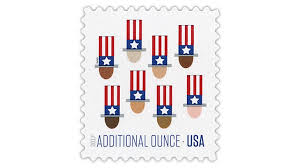 I made a trip to the P.O. to buy “additional ounce” stamps. Also, I decided to get some extra 2-centers, too. Yes, I use Quickbooks and Venmo, but I use the USPS as well. The P.O. clerk handed me the 2-centers and informed me she had no “additional ounce” stamps.
I made a trip to the P.O. to buy “additional ounce” stamps. Also, I decided to get some extra 2-centers, too. Yes, I use Quickbooks and Venmo, but I use the USPS as well. The P.O. clerk handed me the 2-centers and informed me she had no “additional ounce” stamps.
“Do you sell milk?” I said. “This is a post office. You sell stamps! You don’t have stamps? Where can I get the stamps?”
She said try another branch.
I left. I’m not doing any more runs to the P.O. for “additional ounce” stamps. I’ll simply put two first-class stamps on two-ounce mail from now on. So it’ll cost me an extra 49 cents each time. (Maybe my son Ted will get me some additional-ounce stamps if he reads this.) I’ll be spending about $10 more per year by not using the additional-ounce stamp.
—
By the way, I didn’t say “Do you sell milk?” at the P.O. I dreamt that retort up in the P.O. parking lot, post-visit. But the dialogue looks good here, in writing, so pretend I said it.
September 11, 2024 3 Comments
I’M THROWING OUT THESE BOOKS
Every two years I prune my library. My wife insists. If you want any of these books (see list below), stop by my tree lawn before Tuesday — garbage day.

Glenn E. Schembechler
Bowl Game Disasters by Glenn E. Schembechler
Stupid Bastard: The Life of Harry Purim by Meier Meier
10 Days to a Hairless Body by Anne Greune
The Whim of Grit by Malcolm Bolivia
So You Want to Be Jewish? by Miriam Roth
The Story of the Harlem Cooperative Bakery by Rose Lee Pak
Cover Your Lawn with Green Sheet Metal by Jennifer Budzowski
Throw Away Your Truss by Jon Kades
So You Want to Dance, Act, and Play the Clarinet! by Pippi
Kreplach in the Congo by Reb Yellen
Amusing Car Sales by Sid Halpern
Spelling Made EZ by Jaimi Michalczyk
The Peacock Invasion by Morry Corriendo
Good Riddance, Chancres! by Rodney Benton
Cryptic Tokens of Praise (poetry) by Del Spitzer
Whoring in Milan, Rome and Naples by “Lilly”
Goldwater by William E. Miller
The Streets of San Francisco and Richmond, California by Cindy L. Barbour
The Man: Susan B. Anthony by Janice Kugelman-Sugerman
Milk Will Kill You by Len Saltzberg, M.D.
Pet Insurance for Dummies by Buster
Guess Your Friends’ Net Worth by James Kirston
Barbados: Our Key Ally by Cecil Hernandez
Thinking is the New Smoking by Amos The Bison
No Mo’ Boca: A Baby Boomer’s Guide to Retirement by Esther Palevsky
Cuckoos and Grosbeaks by Nancy Dubick
Carolina: The New Promised Land by Irv Weinberg
Visceral Robotics by Suellen Montague
Garbage: A History of Waste Management Inc. by Lake Koonce-Katz
September 4, 2024 5 Comments
EGO
A musician told me he did 200 gigs a year. Impressive. He mentioned they were all nursing-home gigs. Not impressive. (I brag about my nursing home gigs but he can’t.)
The writer Donald Hall told me how much money he made for articles in the The New Yorker and Playboy. He had an audience.
Yiddishe Cup has an audience sometimes, sometimes not. Yiddishe Cup played for 30 people in Grand Rapids, Michigan. That was a long drive. (We’re playing tonight. Details below. A short drive — Pepper Pipes, Ohio.)
A neighbor recently asked my wife and me if we were available for dinner. No, Yiddishe Cup was going on a road trip; the band was flying to Lake Geneva, Wisconsin, for a wedding, then flying to Columbus the next day for a party, and driving home to Cleveland for something — probably a nursing home gig. The neighbor texted Alice and me: “Ahh, the Yiddishe Cup World Tour 2024! How could I forget? Keep on rocking!”
Musicians whine about “World Tour” road-trip trials and tribulations. And you think, “I’d like to do that — go on a tour. Shut up.”
Our recent Yiddishe Cup road-trip weekend was intense — and rare.
A woman asked me, “Does Yiddish Cup still exist?” She had been checking out our Yiddishe Cup website, which hasn’t been updated in years. Maybe I should update it.
—
. . . My cousin Howard Golden just updated the site. Here’s the new home page:

Is that legible? Probably not. Here’s what it says:
“This website is way out-of-date. We don’t need your business. That said, we want your business!
“Some readers — after checking out this historic website — ask, ‘Does Yiddishe Cup still exist?’
“Yes, Yiddishe Cup exists. In 2023 and 2024, Yiddishe Cup played weddings in Temecula, California; Washington, D.C.; Hillsdale, New York; and Lake Geneva, Wisconsin. And of course, we played in Ohio, at concerts, weddings, b’nai mitzvot and community celebrations.”
—
Yiddishe Cup plays tonight (Wed. Aug 28) at 7 p.m. at the outdoor, covered Wain Pavilion on the grounds of Park Synagogue, 27500 Shaker Blvd., Pepper Pipes, Ohio. There are chairs. The concert is free. And if you want, you can donate to Magen David Adom (the Israel Red Cross) at the show.
August 28, 2024 2 Comments
CONCERT FOR ISRAEL
There are three types of Jews. No, not Reform, Conservative and Orthodox. Try American, Israeli and victims of the Holocaust. Each about a third.
The Israeli contingent is top of mind right now, with Iran and its proxies wanting to turn Israel into dead Jews. In America — in Cleveland — what is a Jew to do? I called my friend Shelly Gordon, who moved to Israel after college to become a tennis pro. He played for Ohio State. He still gripes about my childhood private lessons; I violated the South Euclid Tennis Court Oath, which was Don’t Be a Tennis Snob. Shelly‘s strokes are bad but he’s good. He never took a private lesson.
He said, “Ninety percent of Israel is business as usual — going about our lives. I play tennis.” Shelly is a sports nut. He follows the Browns, Buckeye, Cavs and Guardians. In Israel he logs on at 3 a.m. to catch Cleveland sports scores. He once had a yarmulke that read “Cleveland Cavaliers.” On his off days, he visits his children and grandchildren and hopes they don’t get killed.
What‘s a Cleveland Jew to do? Here’s an option. Yiddishe Cup plays a benefit concert for Magen David Adom — the Israeli emergency blood and medical services operation.
The concert is 7 p.m. Wednesday, Aug. 28, at the outdoor, covered Wain Pavilion, Park Synagogue, 27500 Shaker Blvd, Pepper Pike, Ohio.
Magen David Adom is like an Israeli Red Cross. The concert is free but donations are encouraged. Money from the concert — along with gelt from other Cleveland-area contributors — will go toward buying an ambulance.
Yiddishe Cup will play songs from Holocaust-haunted Eastern Europe, America, and songs from Holocaust-avoiding Israel.
Cleveland stands (and sits) with Israel. There are chairs.

August 21, 2024 2 Comments
GREAT BOOKS AND
SOME GREAT PROFS
Paul Ilie, a Great Books professor at Michigan called his students “Mr.” and “Ms.” For example, “Mr. Stratton.” Eighteen-year-old me — Mr. Stratton? Ilie taught The Iliad, Thucydides, Plato, and Sophocles. Glad I read those books.

Paul Ilie
I begged my Inorganic Chem prof for a B. I needed the B for my pre-med transcript. I did C work throughout the semester but got an A on the final. Paul Rasmussen wouldn’t deal; the numbers didn’t add up. Attention, Bert, adulthood ahead.
I asked my Calculus professor, “What is the meaning of all this?” Wilfred Kaplan didn’t blanch. He said he wasn’t sure.
I got a D in Organic Chemistry and switched to English.
Benjamin Franklin V taught Hawthorne, Melville and Twain. I visited Franklin’s house a couple times to listen to jazz records. He had a thing for Babs Gonzales, a hipster vocalese bopper. Franklin was an Ohio State grad from Gallipolis and was related to Ben Franklin. Franklin-the-prof was 11 years older than me and had caught some of the beatnik era.
Another young prof was Bernard Q. Nietschmann. He taught a gut course — Human Geography. He gave me four credit hours for writing a novel. Nietschmann’s main focus was the Miskito Indians of Nicaragua. He once tore up a $20 bill in class to show his disdain for materialistic mainstream culture. The class went nuts, several students screaming at the prof to hand over the money. (Twenty dollars in 1970 equals $160 now.)
Donald Hall held a poetry-writing workshop at his house on South University Avenue. (Workshops weren’t common at Michigan. Lectures were, like 200 kids in a room.) At the workshop we critiqued each other’s work. Hall owned one LP record: Sgt. Pepper’s. Never a music guy – Hall.
Ted Berrigan, an East Village poet, was at Michigan one semester as a visiting professor. Hall got Berrigan the job. Berrigan had interviewed Jack Kerouac for the Paris Review. Berrigan had fans. I was a super-fan.

English 231, Fall 1969
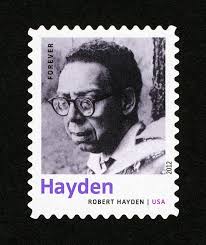 Robert Hayden, another English professor, wound up on a U.S. postage stamp. At his office, I showed him my latest poems but he didn’t cotton to jokey, light fare. He was polite, though. He dressed properly, just like my Great Books prof. Profs dressed either like profs or hippies. There was no in-between.
Robert Hayden, another English professor, wound up on a U.S. postage stamp. At his office, I showed him my latest poems but he didn’t cotton to jokey, light fare. He was polite, though. He dressed properly, just like my Great Books prof. Profs dressed either like profs or hippies. There was no in-between.
August 14, 2024 3 Comments
THE MUSICAL INFLUENCES
IN MY LIFE
From the Cleveland Plain Dealer (7/24/24) . . .
The musical influences in my life
by Bert Stratton
CLEVELAND HEIGHTS, Ohio — I played music with a prodigy. I didn’t know he was a prodigy. He and I were in junior high. He played piano. I played clarinet. I just googled him — William Goldenberg. He wound up at Oberlin College, Julliard, and then Indiana University. He became a professor of piano at a university. I didn’t know him that well; he was the son of a friend of my parents.
I wasn’t in the prodigy’s league. Not even close. But I did practice a lot. I enjoyed the “typing” aspect of clarinet — learning where to place my fingers on the instrument. I blame my parents and my clarinet teacher for much of my musical shortcomings. Leonard Bernstein was not on the TV at our home. There was no “Peter and the Wolf” by Prokofiev. Harry Golub, my clarinet teacher, was an alumnus of the Ohio State University concert band and owned a music store in South Euclid. He sold guitars, bongos and band instruments.
I entered The Contest every year in junior high. The Contest — as we kids called it — was a music-recital competition sponsored by the state music-educators’ association. Young musicians would play their repertoire in front of teacher-judges, who would give us ratings of I, II or III.
I often got III — the worst. I would get nervous and lose my place in the sheet music. Worse, I didn’t know how the piece was supposed to sound because I had never heard a professional recording of it. I especially remember a train wreck on Mozart’s “Divertimento in D Major, Minuetto,” at a contest held at Moody Junior High School in Bedford around 1963. I lost my place several times and had to start over from the beginning. My prodigy accompanist was of no help.
Classical musicians tell you, “I studied with Joe So-and-So, who studied with Marie So-and-So, who studied with Maestro So-and-So.” It’s biblical – the lineage obsession in classical music.

Philip Setzer
My pianist developed a long, impressive bio over the years, but not as long as another guy — from my Little League — who intimidated me even more. He was Philip Setzer, a violinist I went to grade school with. At holiday school concerts at Victory Park School in South Euclid, I’d botch “The Theme from Exodus,” and Setzer would ace-play a Brahms sonata. Phil was a founder of the world-renowned Emerson String Quartet, which, until its members’ recent retirement, was like the New York Yankees of string quartets. Setzer’s mother and father were violinists in the Cleveland Orchestra; he attended many Cleveland Orchestra concerts as a kid. That helped.
In the early 1990s, I played a benefit concert with two Cleveland Orchestra musicians. It was a fundraiser for a Jewish day school. The orchestra musicians asked me whom I had studied with. I said, “Nobody.”
Mr. Nobody: Harry Golub. His store was on Warrensville Center Road at East Antisdale Road. The structure now houses South Euclid Hardware. The building — in the 1960s — also featured a hair salon and a kosher butcher shop, run by Mr. Golub’s father.
Harry Golub often ate Hebrew National salami sandwiches during my lessons. That stunk. He was into real estate. He built a four-suite apartment building across the street from the music store. So he owned two buildings: the music building and the apartment building. He named the apartment building after his daughter, Joyce. Mr. Golub, by his example, taught me about real estate and very little about music. Maybe that’s why my parents sent me there for lessons.
Bert Stratton, a frequent contributor, lives in Cleveland Heights and has also written for The Wall Street Journal and New York Times. He writes the blog “Klezmer Guy: Real Music & Real Estate.”
August 6, 2024 5 Comments
GOING FULL-ESPAÑOL
When I traveled in Latin America in the early 1970s, I was constantly on the lookout for American culture. American culture, not Latin American culture. I was homesick. In Mexico City I heard Kurt Vonnegut give a lecture. I went to American movies. I remember Paper Moon. I attended a Charlie Byrd concert in Bogota. Bryd — a jazz guitarist — had played with Stan Getz. Byrd introduced his band in Spanish, saying “en la batería” for “on the drums” and “en el bajo“ for “on the bass.” Byrd connected linguistically and I admired that. His concert was part of a U.S. State Department tour.
I did an Charlie Byrd imitation last week. I introduced Vulfpeck in Spanish at a concert in Madrid. I spoke Spanish to 3,500 Spaniards!
https://www.youtube.com/watch?v=8P-e3bGDSak

Outdoor concert, Vulfpeck, Madrid, 7/21/24.
I told my son Jack that my intro would take a minute. It took 4:19 minutes. While I blabbed on, Jack became slightly agitated stage-left, in the wings. He signaled me to speed it up but I didn’t see him.
I hate it when a musician says he’ll do a minute and then solos for two minutes. In my defense, re Madrid, some of my stage-hogging time consisted of applause and laughter.
Here’s a translated joke from my intro: “Ladies and gentlemen, I was so excited when I first heard Vulfpeck was going to play Madrid that I immediately went on the internet and checked out the lineup for tonight’s show — Apertura de puertas 7:30 pm, Judith Hill 8:45 pm, Vulfpeck 10:15 pm. I wondered, What is this band Apertura de Puertas?”
“Apertura de puertas” means “Doors open.”
Maybe you had to be there.
—
I had a terrific Spanish teacher, Judith Worth, at Brush High. She wrote me in 1980: “Bert, I was glad to have news of all your classmates, and to know that they are doing well — and have used their Spanish. I was very attached to all of you, as if you were my own kids.” I’ll send her this post. (According to the internet, she’s 87 and living near Austin. I last talked to Mrs. Worth four years ago.)

Charles F. Brush High yearbook, 1968.
July 31, 2024 3 Comments
REFRIGERATORS ARE FUN
The Hotpoint refrigerator — the “value” brand of G.E. — is a good product. It lasts 20 years.
That’s what you want: 15-to-20 years.
And if we start talking stoves, you want even longer. I got 24 years out of a Magic Chef stove. The burners were clogged and the thermostat was shot. Time to buy another one.
I used to buy Spanish refrigerators. Welbilt. The spelling said it all. Good for only nine years. Frigidaire isn’t much better — 10 years.
I buy appliances from a distributor out of Stow, Ohio. He’ll hook up the gas flexline (pigtail) to the stove. I could go to Bernie Marcus at Home Depot, but my guy in Stow is hassle-free and about the same price.
Refrigerators are fun; they don’t often screw up, and you can occasionally get a few beers and pops after the tenant moves out. Definitely some open ketchup.

I didn’t take anything from this refrigerator.
July 24, 2024 1 Comment



